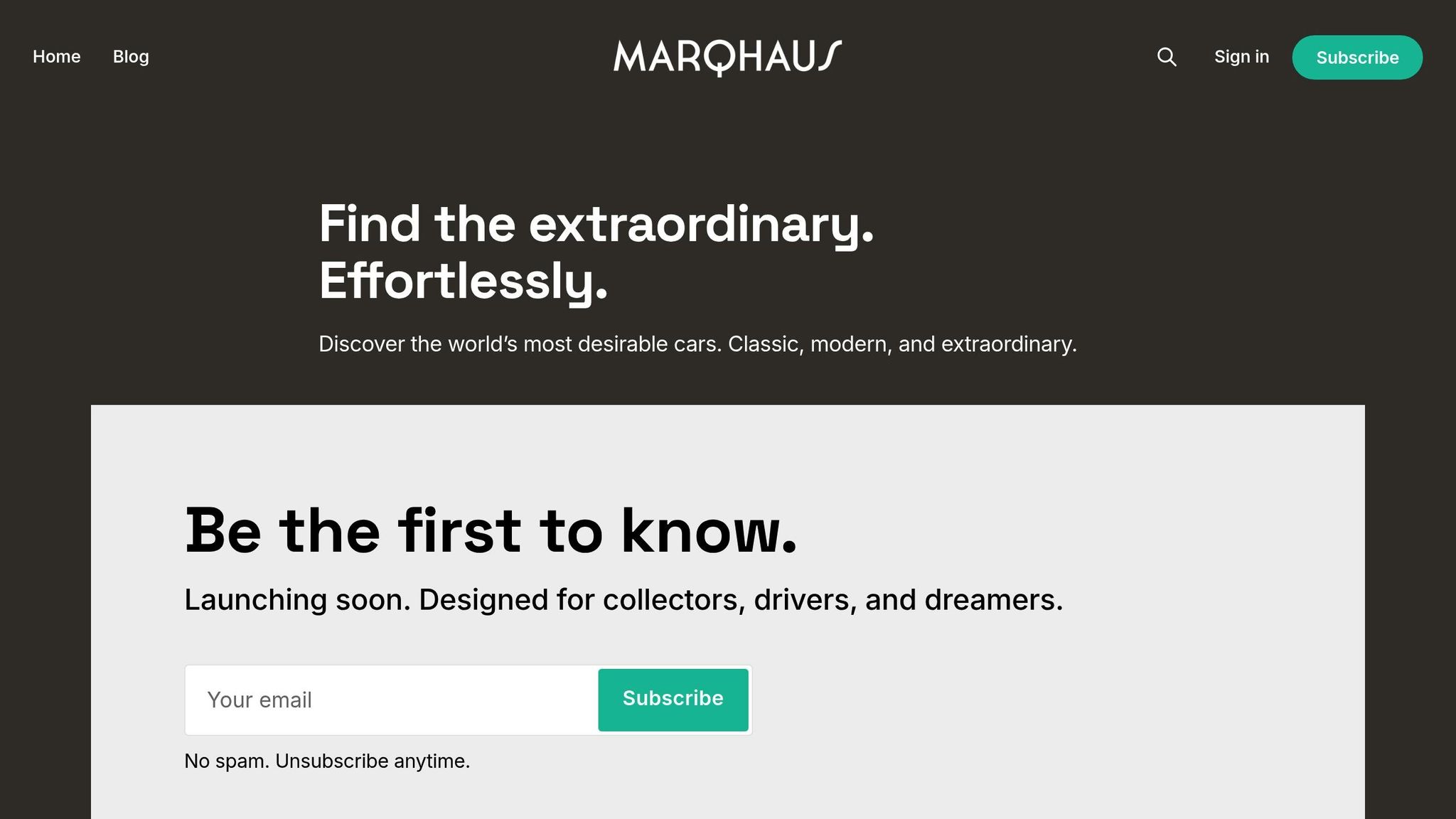Ultimate Guide to Exotic Car Seller Verification
Learn how to safely verify exotic car sellers and avoid scams with essential checks and practical tips for secure transactions.

Purchasing an exotic car can be risky, with scams like fake titles, odometer rollbacks, and deposit fraud being common. Here's a quick breakdown of what you need to know to protect yourself:
-
Red Flags to Watch For:
- Prices far below market value.
- Sellers refusing in-person inspections.
- High-pressure sales tactics.
- Suspicious documentation or VIN details.
-
Essential Verification Steps:
- Background Check: Verify the seller’s credentials, reviews, and online presence.
- Document Inspection: Confirm ownership papers (V5C logbook) and maintenance records.
- Physical Inspection: Check for hidden damage, past repairs, and mechanical issues.
- Use Official Tools: Run DVLA and HPI checks to uncover hidden finance or theft history.
-
Safety Tips for Meetings:
- Meet in public, well-lit spaces, preferably near police stations.
- Bring a trusted companion and share your plans with someone.
- Use secure payment methods like wire transfers or escrow services.
- Why It Matters: Fraud costs buyers billions each year, with 1 in 3 vehicles having a hidden history. Pre-purchase inspections (costing £1,200–£2,800) and tools like HPI checks can save you from costly mistakes.
Step 1: Online Seller Background Checks
Review Seller History
Start by digging into the seller's online presence. Verify their contact details and physical location - tools like Google Street View can be helpful here. Cross-check their contact information across various platforms, and if they claim to be a licensed dealer, confirm their licence number with the appropriate authority.
Legitimate sellers usually have:
- A complete business profile with accurate contact details
- A consistent presence across multiple platforms
- Clear, well-lit photos of vehicles
- Thorough vehicle descriptions and proper documentation
- Prompt and professional communication
When checking reviews, don’t just rely on overall ratings. Look at specific feedback about:
- The accuracy of their vehicle descriptions
- How transparent they were during the transaction
- Their responsiveness to questions or concerns
- Proper handling of documentation
- Support provided after the sale
It’s also important to watch for warning signs that could indicate scams.
Common Scam Warning Signs
Recent figures from the National Highway Traffic Safety Administration show that over 450,000 vehicles are sold each year with tampered odometers. Additionally, IHS research reveals that about one in every 325 used cars has undergone title washing.
Here’s a quick breakdown of common red flags:
| Warning Sign | What to Look For | Risk Level |
|---|---|---|
| Price Discrepancy | Prices far below market value | Critical |
| Documentation Issues | Incomplete or inconsistent paperwork | High |
| Communication Red Flags | Pushy tactics or refusal to meet in person | High |
| Photo Manipulation | Blurry images or use of generic stock photos | Medium |
| Location Inconsistency | Address mismatches registration details | High |
"Deal locally, face-to-face - follow this one rule and avoid the vast majority of scam attempts." – Craigslist
One notable example of a scam occurred in June 2019. The FTC reported a case where fraudsters posted fake ads for cheap used cars on various platforms. They used convincing tactics like online chats and fake invoices, leading to losses totalling hundreds of thousands of pounds.
To avoid falling victim to scams, take these extra steps to verify the seller:
-
Seller Authentication
Investigate the seller’s background using multiple sources. Check their business registration, online activity, and industry experience. Legitimate sellers are upfront and maintain a professional profile. -
Documentation Verification
Ask for all necessary documents and confirm their authenticity before moving forward with any transaction. -
Communication Assessment
Pay attention to how the seller communicates. Professional sellers are consistent, clear, and avoid high-pressure tactics or unrealistic claims.
"If something doesn't feel right, either with the business or salesperson, leave." – Kevin McCarthy, Partner/co-host of the nationally syndicated Car Pro radio show
If you come across a suspicious listing, report it to the relevant authorities, such as:
- Your local Trading Standards office
- Action Fraud
- The Financial Conduct Authority (FCA)
- The Internet Crime Complaint Centre
Step 2: Required Car Documents
Ownership Papers Check
The V5C logbook is the primary document issued by the DVLA to confirm a car's registration and ownership in the UK. For exotic cars, this document is especially critical. When reviewing the V5C, pay close attention to details like the registered keeper's information, the Vehicle Identification Number (VIN), the car's previous ownership history, import status (if applicable), and its technical specifications.
Here are some essential checks to perform:
- Ensure the document is genuine by examining watermarks, clear printing, and the standard DVLA formatting.
- Verify there are no outstanding finance agreements or liens tied to the vehicle.
Ownership verification is a vital step, but it’s equally important to review the car's service history for a complete picture.
Maintenance Records Review
In addition to ownership documents, detailed maintenance records provide valuable insights into the car’s condition and performance. In fact, a well-maintained service history can increase a car's value by up to 20%. Key records to look for include:
- Full service histories from authorised dealers
- MOT certificates
- Records of specialist repairs
- Warranty work documentation
- Accident repair records
Properly documented maintenance can even boost a car’s resale value by 10-30%.
"A car's history is just as important as its horsepower. A well-documented past ensures a valuable future." – Jay Leno
When reviewing these records, look for consistency in service intervals, dealer stamps from authorised centres, and original invoices. With the rise of digital record-keeping, it’s now much harder to falsify service histories.
"Vehicle history reports are only as accurate as the data collected. If a heavily damaged car was privately repaired, that damage likely won't show up on the vehicle history report." – Matt Smith, Senior Editor at CarGurus.com
Make sure to request both digital and paper records to cross-check major services and repairs. Pay particular attention to significant service intervals and warranty-related work, as these details are crucial for verifying the car's maintenance history. A thorough review of these records reduces the risk of fraud and ensures a smarter investment.
Step 3: Physical Car Inspection
Car Inspection Steps
When assessing an exotic car, a detailed physical inspection is essential. Start with a careful examination of the exterior under good daylight conditions. Pay close attention to the paintwork and how the panels align - any irregularities might suggest past repairs or accidents.
Here are the main areas to focus on:
-
Body and Paint Check
Inspect the paintwork to ensure it’s even across all panels. A magnet can help detect body filler - if it doesn’t stick, it’s a sign of previous repairs. Also, check the gaps between panels; uneven spacing could indicate subpar repairs or assembly flaws. -
Mechanical Inspection
- Engine: Look for oil leaks, particularly around the pan and rear main seal.
- Suspension: Press down on each corner of the car; it should rebound only once.
- Brakes: Confirm the brake pads are thick enough and the rotors are in good shape.
- Transmission: Ensure it operates smoothly without any unusual sounds.
- Underbody: Examine for rust, damage, or signs of previous repairs.
Once the car’s condition is thoroughly reviewed, the next step is arranging a safe meeting to finalise the process.
Safe Seller Meetings
After completing the physical inspection, prioritise safety when meeting the seller in person. Choose a secure location to continue your evaluation. For example, the Gresham Police Department in Oregon provides a "safe exchange zone" monitored by 24-hour video surveillance.
To ensure personal safety, follow these precautions:
- Meet during daylight in public spaces, ideally near police stations.
- Bring along a trusted friend or family member who is knowledgeable about cars.
- Record the seller’s identification details.
- Share your meeting plans, including time and location, with someone you trust.
Here’s a quick guide to safety measures:
| Safety Measure | How to Implement It |
|---|---|
| Location Selection | Opt for well-lit public spaces with CCTV coverage. |
| Documentation | Take photos of the seller’s ID and vehicle papers. |
| Communication | Stay in touch with a trusted contact throughout. |
| Test Drive Safety | Share your planned route and return time. |
"It's a little more assurance that things are going to happen the way that they want it to happen", explains Sgt. John Rasmussen of the Gresham Police Department. "People with ill intentions are going to want to steer away from it."
For added peace of mind, consider meeting in areas with established safety measures, such as police station car parks or reputable dealership forecourts. Always pay attention to your instincts - if something doesn’t feel right, don’t hesitate to walk away. Combining a thorough inspection with a secure meeting process is key to protecting your investment.
5 Scams Most People Fall For When Buying Their First Exotic
Step 4: Official Verification Tools
Once you've reviewed backgrounds and documentation, it's time to reinforce your process with official verification tools. These tools help confirm every detail, leaving no room for doubt.
UK Vehicle Checks
For exotic cars, DVLA online checks are a must. With statistics showing that 1 in 3 cars has a hidden history, careful verification is non-negotiable.
Key areas to verify include:
| Check Type | What It Reveals | Cost |
|---|---|---|
| DVLA Basic | Tax status, MOT validity, vehicle specifications | Free |
| MOT History | Past test results, advisories, failure points | Free |
| HPI Full Check | Outstanding finance, theft status, write-off history | From £9.99 |
| V5C Document | Ownership verification | £25 |
When using DVLA data, cross-check the following:
- Look for the 'DVL' watermark on the V5C document.
- Confirm the serial number against ranges of stolen V5C documents.
- Ensure the VIN matches across all paperwork.
- Verify the engine number for consistency.
"You should do an HPI check before you hand over your payment", recommends HPI, which reports uncovering 109 stolen cars and 2,205 insurance write-offs daily.
HPI checks are particularly comprehensive, pulling data from sources such as:
- The Police National Computer (PNC)
- DVLA records
- Insurance databases
- Manufacturer records
- Finance companies
For a streamlined experience, platforms like MARQHAUS integrate these checks into their services, simplifying the process for buyers.
MARQHAUS Platform Benefits

MARQHAUS provides a specialised marketplace for rare supercars and high-value classics. It connects collectors and enthusiasts with exceptional vehicles while offering early notifications for exclusive listings.
Thorough checks can reveal hidden issues that might otherwise go unnoticed. For instance:
"I found this extremely useful as I discovered the car I was buying had a mileage discrepancy when checked with HPI... This was resolved by the seller, but without the HPI check, I would not have been any the wiser." – Ben Hattersley
With 1 in 3 vehicles still under finance agreements, these tools are essential for safeguarding your investment. When combined with detailed background and physical inspections, they provide the confidence needed for a secure purchase.
Conclusion: Safe Buying Steps
Buying an exotic car is no small feat - it requires careful attention to detail and thorough checks. With over £6.1 billion in lender exposure to fraud in 2021, it’s clear that every step in the verification process matters.
Here are the essentials to keep in mind:
Document Authentication
Always verify the paperwork. Use tools like DVLA checks and HPI reports to ensure the documents are legitimate and up to date.
Financial Protection
Stick to secure payment methods. Wire transfers are reliable, and for added peace of mind, consider using escrow services.
"Exercise caution and diligence when engaging in transactions. Research your counterparts, scrutinise their credentials, and insist on secure payment methods like wire transfers. Remember, trust is earned, not assumed, in the intricate dance of buying and selling exotic cars."
– Tim Rogers, COO of We Buy Exotics
Professional Inspection
A pre-purchase inspection (PPI) by an independent professional is essential. These inspections reveal hidden issues and confirm the car’s history and condition. This is especially important as 84% of dealerships reported a rise in identity fraud cases. Platforms like MARQHAUS simplify this process by integrating these checks into their service.
Speaking of MARQHAUS, it’s a standout option for those interested in rare and classic cars. Their platform not only connects buyers with exceptional vehicles but also ensures rigorous verification. Plus, their early notification system for exclusive listings gives buyers an edge in accessing highly sought-after cars.
As the luxury car market continues to grow, robust verification measures are more important than ever. By following these steps and using trusted platforms like MARQHAUS, buyers can confidently navigate the exotic car market while safeguarding their investments.
FAQs
How can I verify that an exotic car seller is trustworthy?
When buying an exotic car, ensuring the seller is reliable is crucial. Here are some key steps to help you make a secure purchase:
- Check the Vehicle Identification Number (VIN): Make sure the VIN on the car matches its registration documents and historical records. This helps confirm the car's identity and protects you from potential fraud.
- Investigate the car's history: Request a comprehensive vehicle history report. This will reveal details about past accidents, title issues, or any inconsistencies you should be aware of.
- Get a pre-purchase inspection: Hire a skilled mechanic to thoroughly examine the car. A professional inspection can uncover hidden problems that might not be obvious during a quick look.
- Assess the seller's reputation: Look for a professional online presence and read genuine customer reviews. Be cautious of sellers who use high-pressure tactics or offer deals that seem suspiciously low.
Taking these precautions can minimise risks and give you peace of mind when buying an exotic car.
How can I verify that the documents provided by an exotic car seller are genuine and accurate?
When buying an exotic car, it’s crucial to verify the authenticity of the documents provided by the seller. Start by comparing the Vehicle Identification Number (VIN) on the car with the one listed on the documents. This step confirms the car’s identity and rightful ownership. Next, review the title and registration details, ensuring they align with the seller’s identification. To avoid any surprises, use a title check service to see if the vehicle has any outstanding finance or liens.
Another important step is to request a vehicle history report. This report can provide valuable insights, including details about previous owners, accident records, and any title-related issues. Whenever possible, inspect the car in person. Hiring a professional to examine both the vehicle and its documentation is also a wise move. Taking these precautions can help you steer clear of fraudulent transactions and buy with confidence.
What should I do if I suspect a seller is trying to scam me when buying an exotic car?
If you think a seller might be trying to scam you during the purchase of an exotic car, it’s crucial to act promptly and carefully. Stop the process right away and focus on confirming the seller’s credibility before moving forward.
Start by arranging to see the car in person, and make sure the meeting happens in a safe, public place. Verify that the seller’s ID matches the details on the car’s documents, such as the logbook (V5C). Run a VIN check to look into the car’s history and confirm it hasn’t been stolen or declared a total loss. Be especially cautious if the price seems unusually low - this is often a warning sign.
If the seller tries to rush you into making a decision or suggests unusual payment methods like wire transfers or prepaid gift cards, these are clear red flags. Trust your gut - if something doesn’t feel right, it’s safer to walk away than to take unnecessary risks.




